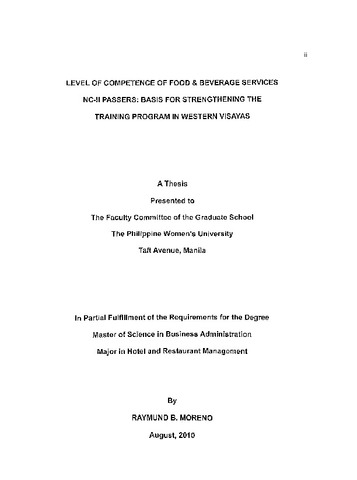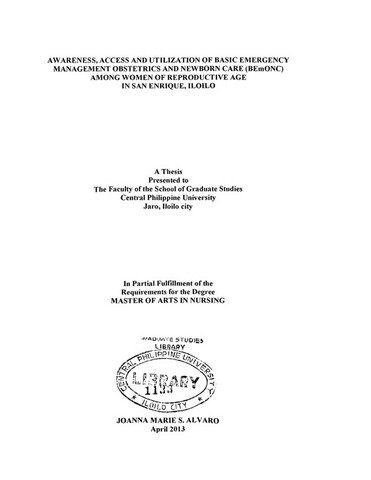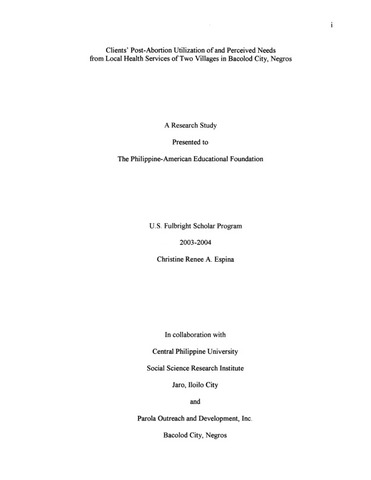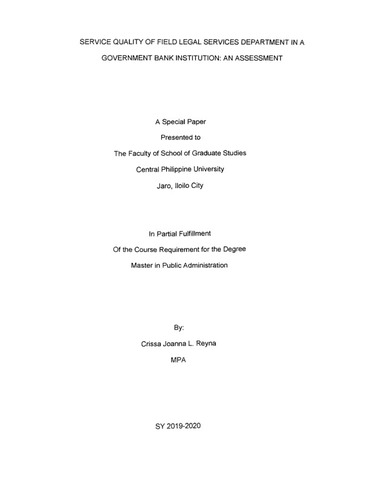Level of competence of Food & Beverage Services NC-II passers: Basis for strengthening the training program in Western Visayas

Page views
11,270Date
2010Author
Thesis Adviser
Defense Panel Chair
Share
Metadata
Show full item record
Abstract
Purpose of the Study
This study was conducted to assess the level of competence of Food and Beverage Services NC II passers in Western Visayas as part of ensuring that what industry wants (stated as a competency standard) comes back in outcomes of training (represented by a credential issued to a learner). Thus, the result of the study serves as the basis for designing a proposed training plan in strengthening the Food and Beverage Services NC II Training Program in Western Visayas. The research was conducted last December 2009 - January 2010 with 50 certified passers and 8 supervisors assigned in different hotel establishments in Region 6 as participants of the study, the levels of competence were determined and classified as to basic, common and core competencies. The study likewise examined issues and concerns of the trainees on the conduct of the Food and Beverage Services NC II training and competency assessment.
Methodology
This study utilized the descriptive research design. The purpose of which was to investigate the level of competence of Food and Beverage Services NC II passers in Western Visayas in their workplace as rated by themselves and their supervisors. The researcher used the survey questionnaire to collect relevant data from the population in this study.
The researcher-made questionnaire-checklist which is based from TESDA’s training regulations for Food and Beverage Services NC II and subjected to face and content validation by a panel of experts. Frequency count, means, standard deviation, ranks and SPSS software were the statistical tools utilized in the study.
Summary of Findings
1. Ratings of Participants on the Level of Competence of Food and Beverage NC II passers
1.1 Basic Competencies combined ratings of the NC II passers rated themselves as “highly competent” with an average mean of 4.38 while supervisors rated NC II passers as “competent” with an average mean of 4.12 on the level of competence. This means that passers are fully aware of the basic competencies required by the industry in their workplace. Moreover, the supervisors’ ratings on the basic competencies which were rated mostly as “competent” show that the NC II passers were not able to meet the expectations of the supervisors in applying basic competencies in the workplace;
1.2 Common Competencies, grand mean ratings of the NC II passers rated themselves as “highly competent”, with an average mean of 4.43 while supervisors rated NC II passers as “competent” with an average mean of 4.13 on the level of competence;
1.3 Core Competencies in provide link between kitchen and service area, most NC II passers rated themselves as “highly competent”, obtained a mean of 4.52. However, the supervisors rated NC II passers “competent”, obtained a mean of 4.00. It shows that the perceptions of the supervisors to the NC II passers are as not that highly competent worker in applying common competencies in their workplace. In provide food and beverage services to guests, NC II passers themselves rated “highly competent”, obtained a mean of 4.56 which means they are fully aware and practice in consonance with the standards required by the industry. However, in viewpoints of their supervisors, they rated NC II passers as “competent”, obtained a mean of 4.26. In provide room service competency, both respondents rated “highly competent”, obtained a mean of 4.59 and 4.25 respectively. This means that they know the proper procedures in performing tasks in providing room service to guests. In develop and update food and beverage knowledge competency, both respondents rated “highly competent”. This means most of them were knowledgeable on how to develop and update their knowledge in food and beverage services.
2. Statistical Findings on the significant difference between the ratings of the Participants.
The results of the t-test on all competency standards for Food and Beverage Services NC II Training, namely; basic, common and core competencies show that there are significant differences among the responses of participating NC II passers and their respective supervisors working in different hotels in Western Visayas. The obtained p value of .008, .006 and .000 for t-test paired differences was less than .05 alpha levels on basic, common and core competencies.
3. Issues and concerns on the conduct of Food and Beverage Services NC II training and Competency Assessment.
3.1 Study revealed that five (5) common issues and concerns on the conduct of Food and Services NC II Training are identified as follows according to its ranking: (1) Qualification of the Trainer/Instructor; (2) Methodology/ Strategies of Teaching; (3) Qualification of the trainees (4) Training facilities, tools, equipment and materials; (5) and lastly Training duration;
3.2 On issues and concerns among Food and Beverage Services NC II passers on the conduct of the competency assessment, the following are identified, (1) Issuance of COC/NC certificate” because the timeline for the issuance of COC/NC certificate is not released by TESDA after one week; (2) Conduct of the competency assessment; (3) Assessment venue (4) Assessment methodology and procedures; (5) Preparation for the assessment; and lastly (6) Competence of the assessor.
Conclusions
Based on the findings of the study, the following conclusions were drawn:
1. There is a varying degree of responses on the perceived level of competence of Food and Beverage Services NC II passers in Western Visayas in terms of basic competencies as rated by the NC II passers’ themselves compared to the ratings of their respective supervisors wherein it can be concluded that despite of the competency in the field of communication, teamwork, problem solving and planning, the F&B NC II passers need more training to improve their knowledge and skills of basic competencies;
2. Likewise, in terms of common competencies on the level of competence of Food and Beverage Services NC II passers in Western Visayas, the findings resulted to a clear manifestation that F&B NC II passers need to ensure that education and training are directly linked to the expressed needs of industry. The application of competency standards at the individual level requires both workers and managers to develop an appreciation of their uses;
3. Generally, on the perceived level of competence based on core competencies, both respondents are in agreement in the importance of executive bodies of national systems that work in the field of competencies standardization and/or certification applied to meet the required standards of industry;
4. Results of hypothesis testing revealed that the three areas of basic, common and core competencies rated by participants are significant, thus hypotheses are rejected;
5. Despite of the mandated standards of Food and Beverage NC II Trainings and Competency Assessment, participants are in agreement that there are major issues and concerns to be accounted for further improvements.
Recommendations
In view of the findings of the study, the following recommendations are offered:
1. The training institutions offering Food and Beverage Services NC II qualification must hire qualified, efficient, knowledgeable and competent trainers;
2. Formulation of a proposed training plan to strengthen the Food and Beverage Services NC II Training Program in Western Visayas to meet the required standards of the industry. This proposal inputs may be submitted to TESDA for evaluation and for immediate action. (refer to page 84 on the draft of the training plan);
3. The Philippine Women’s University can spearhead seminar-workshop for enhancing teaching methodologies and updating knowledge and skills among trainers of Food and Beverage Services NC II trainers/instructors;
4. Further research should be conducted in the other areas of the hotels and restaurants that require the application of the mandated competency standards in education and training such as housekeeping, front office etc.
Description
Abstract only
Suggested Citation
Moreno, R. B. (2010). Level of competence of Food & Beverage Services NC-II passers: Basis for strengthening the training program in Western Visayas (Unpublished Master’s thesis). Philippine Women's University, Taft Avenue, Manila.
Type
ThesisSubject(s)
Keywords
Department
Graduate SchoolDegree
Master of Science in Business Administration Major in Hotel and Restaurant ManagementShelf Location
GSL Theses 647.94072 M816
Physical Description
xix, 109 leaves
Collections
- Theses [3]
Related items
Showing items related by title, author, creator and subject.
-
Awareness, access and utilization of Basic Emergency Management Obstetrics and Newborn Care (BEmONC) among women of reproductive age in San Enrique, Iloilo
Alvaro, Joanna Marie S. (2013)Women’s utilization of maternal health care facility is an important health issue with regard to the wellbeing and survival of both the mother and her child during childbirth. There are certain factors however that inhibit ... -
Clients’ post-abortion utilization of and perceived needs from local health services of two villages in Bacolod City, Negros
Espina, Christine Renee A. (2004)Induced abortion is generally restricted in the Philippines, although it may be permitted to save the mother’s life. The stigma associated with abortion often outweighs the perceived need to seek professional medical ... -
Service quality of field legal services department in a government bank institution: An assessment
Reyna, Crissa Joanna L. (2020)In an increasing competition in the market, it is important for an organization to maintain a high quality service not only in providing services to external clients but to internal clients as well. Service quality is a ...




